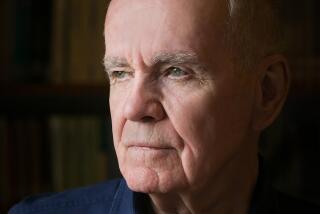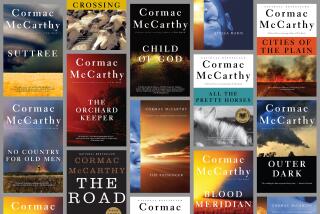A Mercurial Titan of Historical Fiction
- Share via
A monster. A coward. Conceited, supercilious, arrogant, a hypocrite, self-delusional. Heartless. With these words, the Sunday Times of London recently fired another stabbing broadside at the just-deceased British novelist Patrick O’Brian.
On his home soil, the once-obscure, then celebrated O’Brian has not been treated kindly--not in the final two years leading up to his death in Dublin in January and not in the weeks since. Mercifully, the first serious biography about the writer comes from a source far less dyspeptic than Fleet Street.
American Dean King, an expert in nautical history and a man who knows more about O’Brian than anyone I’m aware of, has set a different tone on these shores for evaluating one of the 20th century’s most improbable literary figures. First in an article in New York magazine and now with a 375-page biography, King casts a sober eye but not a cold heart on this secretive writer whose followers lionize him for his 20-volume sequential novel of British seafaring life during the age of Napoleon.
*
Had he lived to read it, O’Brian may have loathed this biography. He detested all scrutiny of his personal life, as well he should have. He lived an inexplicably messy, even seemingly cruel, existence. Example: As a 30-year-old, O’Brian walked out on his struggling wife, a dying daughter and a son, changed his name, fabricated his background and apparently never sought amends.
But apart from what the secretive O’Brian might have thought, his devotees should rejoice at this account of his life, written with appreciative balance, rich with literary insight. King seems to pull no punches, nor does he deny that the quality of the art can, at times, surpass the character of the artist.
I, for one, will always hold a grudge against O’Brian for refusing to speak with King for this biography and urging associates to do the same. When I interviewed O’Brian two months before his death, I was advised not to raise the subject of King’s research at the peril of having O’Brian stalk from the room. Yet O’Brian is unlikely to receive more evenhanded and knowledgeable treatment than from this biographer, who also wrote a companion atlas and dictionary to O’Brian’s seafaring series. If O’Brian’s personality had more twinkle than shines through this account, a doubtful proposition, the omission comes at his own hand.
What there is to celebrate about O’Brian, King does. His analysis is crisp and engaging. Even devout readers will deepen their understanding of O’Brian’s wondrous 2 million-word magnum opus and the author’s studious techniques. King opens our eyes as well to the varied quality of O’Brian’s earlier work.
What cannot be celebrated, King recounts dispassionately. He neither excuses O’Brian nor judges him piously. When the novelist’s actions and motives seem inexplicable, King allows O’Brian a difficult childhood but leaves further psychological guesswork to readers.
Patrick O’Brian was an exceedingly difficult man in temperament. Even his dear friends said as much. He is even more difficult to the biographer, for he lived an uncommonly cerebral life. The excitement flared from within. He wrote of distant worlds but was not traveled. He wrote of grand adventure but lived his days in routine. From facts in dusty libraries, he created stories as alive and authentic as if he had drawn them from experience. He probed the human heart with acumen he did not always display in his own relationships. Unlike some creative people, he displayed scant vibrant exterior to illuminate the interior power of his imagination. Only in his devotion to literature does O’Brian fit the convention of genius, and of that he shared only what came from his pen.
His first novel was published when he was 15, and he was writing the 21st installment of his seafaring series during the last week before his death in January at age 85. In the intervening interval, he produced an astonishing range of novels, stories, biographies and translations--from youthful books in which animals are the main characters, to Kipling-esque Indian adventure tales, to dense and gloomy stories of angst, to accounts of Picasso and the naturalist Joseph Banks, to the English language translations of Simone Beauvoir.
In the end, O’Brian’s greatest love was fiction drawn from historical events of the early 19th century: The compressed world of sailing ships, of lifelong friendships, of full-flowered humanity, of bawdy romance and breathless battles, of gritty home life in the British countryside, all spelled out with precision and at a pace that provides sanctuary from the confusing onrush of today.
These stories of “Lucky” Capt. Jack Aubrey and his surgeon Stephen Maturin gained wide renown only in the final 10 years of O’Brian’s life. His Aubrey-Maturin books have since been widely accepted as some of the most important historical fiction of the age, and sold at least 3 million copies.
The fairy tale was interrupted in 1998, when it was revealed that O’Brian was not an Irishman, as he said, but a Londoner. He wasn’t even Patrick O’Brian by birth, but Richard Patrick Russ. A whole life of secrecy unraveled around him. King uncovers worse yet: O’Brian turned his back on a daughter dying of spina bifida and estranged himself from a son for decades.
Lately it has become a cliche among aficionados to suggest that one of the greatest characters O’Brian ever created was the fiction of his own life. Dean King lays that easy idea to rest.
O’Brian endures and captivates readers for reasons this biography sets forth lucidly: The work that sprang from his extraordinary imagination towers over both the real and the fictional O’Brians. He won our hearts and earned our loyalty. But in the end, we must accept that Patrick O’Brian wrote better and with more flair than he lived. He said he wanted to be remembered and judged by his work alone. Now we know why. Dean King does his memory justice aplenty.
More to Read
Sign up for our Book Club newsletter
Get the latest news, events and more from the Los Angeles Times Book Club, and help us get L.A. reading and talking.
You may occasionally receive promotional content from the Los Angeles Times.










